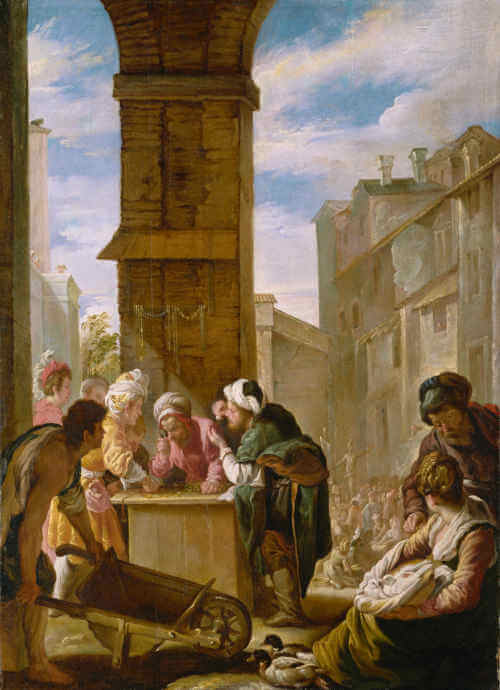
Spiritual Sunday
As classes begin tomorrow at Sewanee and other colleges around the country, here’s a George Herbert poem that refers to higher learning. As the poet sees it, even the most dazzling knowledge does not surpass our love for God.
The poem takes its title from Jesus’s “pearl of great price” (Matthew 13:45-46), which I wrote about recently:
Again, the kingdom of heaven is like unto a merchant man, seeking goodly pearls: Who, when he had found one pearl of great price, went and sold all that he had, and bought it.
Like the merchant, Herbert is already wealthy, boasting of knowledge (first stanza), honor (second stanza), and sensual pleasure (third stanza). Because of this wealth, his simple declaration “Yet I love thee” is all the more powerful. Elaborate argumentation is offset by these four words.
The opening lines are a reference to the head and the heart. Europe is just entering the age of modern science, with “reason” laying bare the secrets of nature (and sometimes rediscovering previous breakthroughs). William Harvey has discovered the workings of the heart (“the pipes that feed the press, and make it run”). explorers are entering “new-found seas,” and Francis Bacon is formulating the scientific method (the “laws and policy” of learning). The poet possesses the keys to “cause and history.” “Yet I love thee”:
I know the ways of learning; both the head
And pipes that feed the press, and make it run;
What reason hath from nature borrowed,
Or of itself, like a good huswife, spun
In laws and policy; what the stars conspire,
What willing nature speaks, what forc'd by fire;
Both th'old discoveries and the new-found seas,
The stock and surplus, cause and history;
All these stand open, or I have the keys:
Yet I love thee.
The poet also know all about honor including courtesy, wit, and the pursuit of glory. He understands the spirit required to “sell my life unto my friends or foes.” “Yet I love thee.”
I know the ways of honour; what maintains
The quick returns of courtesy and wit;
In vies of favours whether party gains
When glory swells the heart and moldeth it
To all expressions both of hand and eye,
Which on the world a true-love-knot may tie,
And bear the bundle wheresoe'er it goes;
How many drams of spirit there must be
To sell my life unto my friends or foes:
Yet I love thee.
Pleasure involves hot blood and brains, mirth and music, love and wit. The poet is no aesthete, telling us that his “stuff is flesh, not brass” and that “his senses live.” After all, they outnumber him 5-1. “Yet I love thee.”
I know the ways of pleasure; the sweet strains
The lullings and the relishes of it;
The propositions of hot blood and brains;
What mirth and music mean; what love and wit
Have done these twenty hundred years and more;
I know the projects of unbridled store;
My stuff is flesh, not brass; my senses live,
And grumble oft that they have more in me
Than he that curbs them, being but one to five:
Yet I love thee.
It is because Herbert is so blessed with these riches that he appreciates God, fully understanding (like a merchant) “both the main sale and the commodities.” He concludes the poem by observing that he didn’t figure this out on his own, however. In one last image of finery, Herbert says that God has shown him the way with a silken rope, reminiscent of Herbert’s pulley:
I know all these and have them in my hand;
Therefore not sealed but with open eyes
I fly to thee, and fully understand
Both the main sale and the commodities;
And at what rate and price I have thy love,
With all the circumstances that may move.
Yet through the labyrinths, not my groveling wit,
But thy silk twist let down from heav'n to me
Did both conduct and teach me how by it
To climb to thee.
The poem may be autobiographical, with Herbert explaining why he abandoned a promising court life to become rector at a small rural church. It is all the more admirable when read in that light.
Further thought: Yesterday Julia and I attended, via Facebook, the funeral of William Boyd, who lived with us for six years and helped us bring up our children. (I recently wrote about William here.) Like Herbert, William could have had other careers, either as a charismatic gospel singer or as a well-compensated bank administrator. Instead, he chose to become a pastor of an impoverished Baltimore church. Listening to accounts of his ministry, I had no doubt that he had focused on the pearl of great price.